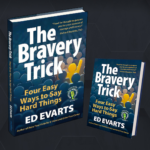I have a habit when I write or respond to emails from a client. Like most habits, I thought this was something everyone does and I did not pay a lot of attention to the habit, until recently.
When speaking with the boss of one of my clients, he mentioned how important “grace notes” were in crafting an email. I asked him what a grace note is. He said, “it is when you start a business email with a softer, more personal tone, rather than just jumping into business. It helps calm folks down and helps you build great relationships.” Not only did I tell my client’s boss that I thought grace notes was a brilliant idea, creating grace notes is something that I have done naturally for years. Here are some ways I use grace notes.
On Monday or Tuesday, I start every email with:
- “Hi Bob. I hope you had a great weekend!” or “I hope you had fun with weekend” or “I hope your week is starting off well.”
On Tuesday, Wednesday, or Thursday, I start every email with:
- “Hi Sarah. I hope your week is going well” or “I hope you are having a great week” or “Yeah! It’s hump-day!”
On Thursday or Friday, I start every email with:
- “Hi Karen. I hope you’ve had a great week!” or “Another week has flown by! Can you believe it?” or “I hope you’ve got big plans this weekend.”
Regardless of the day of the week, to whom I am crafting the email, or generally the topic at hand, I always include a grace note in my emails.







